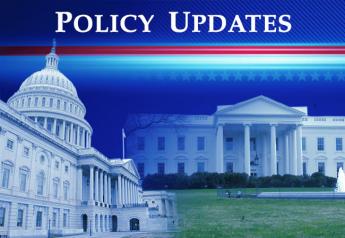Evening Report | January 17, 2024

Check our advice monitor on ProFarmer.com for updates to our marketing plan.
EarthDaily Agro: Brazil’s Mato Grosso soybean yield worst in 15-year data set... EarthDaily Agro, a division of Canada-based EarthDaily Analytics, said data suggests Brazilian soybean farmers in top Brazilian grain grower Mato Grosso state are looking at the lowest yield of the past 15 years. The software and satellite data firm projects Mato Grosso soybean yields at an average 52.12 bags per hectare, more than 10 bags lower than last year.
A metric used to quantify the health and density of vegetation using sensor data “shows very poor evolution” in Mato Grosso, EarthDaily said. “(Soy) yield in the state is estimated at 15% below trend. The worst result was in 2016, when it was 13% below the trend,” the firm noted.
In Goias, another large center-western producing state, soybean yields are projected at 7% below the 15-year trend. The worst result occurred in 2015, when yields were 19% below trend in the state, EarthDaily Agro said. In Parana, yields are currently 2% below trend.
The firm pegged Brazil’s soybean crop at 149.2 MMT but noted “a downward trend.”
Brazil has soybean quality issues, too... Drought effects on Brazil’s soybean crop size are well documented. What hasn’t gotten much attention are impacts adverse weather has had on soybean quality. Hot and dry conditions during the pod-fill phase of early maturing soybeans in central Brazil resulted in low quality soybeans for many producers in the worst areas. South American crop consultant Dr. Michael Cordonnier says crop quality should improve on later-maturing soybeans, as weather has somewhat stabilized since late December with increased rainfall.
However, that can be a double-edged sword. January is generally the peak of the rainy season in central Brazil, which can be a challenge for harvesting soybeans. Prolonged periods of rainfall and high temperatures can quickly result in moldy and shriveled soybeans.
If poor soybean quality becomes a widespread issue, it would impact Brazil’s exports as exporters would have to blend more soybeans to meet shipping specifications.
Senate taking steps to clear CR by Thursday; House vote expected Friday... Senate leadership is moving to establish two new funding deadlines on March 1 and March 8, with the goal of avoiding a partial government shutdown, and giving appropriators still more time to write fiscal year (FY) 2024 funding bills that adhere to the topline agreement reached by Senate Majority Leader Chuck Schumer (D-N.Y.) and House and Speaker Mike Johnson. (R-La.). The Senate on Tuesday evening voted 68 to 13 to invoke cloture on the motion to proceed to the legislative vehicle for the latest continuing resolution (CR).
Senators need to agree on the timing for passing the measure before the Saturday deadline and this requires unanimous consent.
The House aims to take up the stopgap bill by Friday, potentially bypassing procedural votes but requiring two-thirds support (290 votes) for passage, very likely with big assistance from Democrats.
If these steps proceed smoothly, the Senate could clear the stopgap by Thursday, followed by House passage on Friday, thus avoiding a partial shutdown. However, any delays or uncertainties in Senate passage or House support could lead to a brief shutdown affecting various agencies, including USDA.
Tax package faces uncertain future amid lack of support and political hurdles... A tax deal around $80 billion announced by Sen. Ron Wyden (D-Ore.) and Rep. Jason Smith (R-Mo.), who lead Congress’ tax-writing committees, is facing some key hurdles. The deal includes breaks for research and development, business interest, equipment depreciation, and changes in the child tax credit aimed at benefiting the working poor. It also includes disaster aid for impacted producers.
The tax deal still faces significant obstacles and does not have enough support to move forward, sources advise. It needs to merge with legislation to avert a partial federal shutdown, which adds complexity and uncertainty to its passage.
Of note, key political figures, including Speaker Mike Johnson (R-La.) and Senate Majority Leader Chuck Schumer (D-N.Y.), have not yet commented on the deal, and President Joe Biden has not endorsed it.
The package may require strong Democratic support in the House due to the narrow House GOP majority, making it vulnerable to opposition from a small number of Republicans. While Senate negotiators have been working on a border package with the White House, Johnson does not favor language in the Senate bill. But McConnell has been urging Republicans to accept the deal expected to be finalized in the coming days, as Biden appears to be taking the border situation seriously after a lengthy time of inaction on Republican requests.
Sen. Mike Crapo (R-Idaho), the top Republican on the Senate Finance Committee, wants some changes. After briefing panel members Tuesday night that he backs reviving business tax benefits and is open to “an appropriate child tax credit set of provisions,” Crapo said he has issues with the current package, but no specifics are available.
The tax package includes the following provisions (Source: Farm CPA Report):
- Postponing the requirement to amortize research and experimentation expenses until taxable years beginning after Dec. 31, 2025, potentially requiring amended tax returns for those who already amortized these expenses in their 2022 returns.
- Allowing taxpayers to include depreciation and amortization in adjusted taxable income for calculating business interest expense retroactively to the 2022 tax year.
- Extending 100% bonus depreciation through Dec. 31, 2025, with a gradual reduction to 20% for assets placed in service in 2026 and zero thereafter.
- Minor increases to Section 179 for 2024, allowing farmers and other taxpayers to expense up to $1.29 million and increasing the phase-out threshold.
- Modifications to the refundable child tax credit, increasing it to $1,800 in 2023, $1,900 in 2024, and $2,000 in 2025. It will also be adjusted for inflation starting in 2024.
- Allowing taxpayers to use previous year income to calculate earned income for 2024 and 2025.
- The child tax credit is set to revert to $1,000 in 2026, and a tax exemption will be allowed, potentially reducing the credit for those who do not pay taxes.
- The tax package extends disaster-related personal casualty loss changes, removing the rule that losses must exceed 10% of AGI and $500 to be allowed.
- Compensation related to losses or damages resulting from certain wildfires would be excluded from gross income, applying to losses incurred between Jan. 1, 2020, and Dec. 31, 2025.
- Form 1099-MISC and 1099-NEC thresholds would be increased to $1,000 for payments made in 2024, adjusted for inflation thereafter.
- The penalties for promoters of Employee Retention Credit (ERC) would be increased from $1,000 to the greater of $200,000 or 75% of the gross income of the promoter. Promoters meeting specific criteria would need to provide information to the IRS.
- The statute of limitations for ERC credit claims would be extended to six years, allowing taxpayers to claim a wage deduction for invalid ERC claims.
- The provision bars any ERC claims after Jan. 31, 2024.
Fed’s Waller urges caution when time comes to lower rates... Central bankers need to watch their step when it comes time to consider lowering rates, Federal Reserve Governor Christopher Waller said. “Methodically and carefully” is the way to go, Waller added. “As long as inflation doesn’t rebound and stay elevated, I believe the FOMC will be able to lower the target range for the federal funds rate this year,” Waller said at a virtual event hosted by the Brookings Institution on Tuesday. “When the time is right to begin lowering rates, I believe it can and should be lowered methodically and carefully,” he noted. “With economic activity and labor markets in good shape and inflation coming down gradually to 2%, I see no reason to move as quickly or cut as rapidly as in the past,” he said, pointing to previous economic shocks that have precipitated rapid rate cuts.
Bottom line: Waller described current financial conditions as restrictive and said “the setting of policy needs to proceed with more caution to avoid over-tightening… I believe policy is set properly,” he said. “It is restrictive and should continue to put downward pressure on demand to allow us to continue to see moderate inflation readings.”






